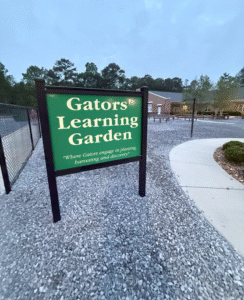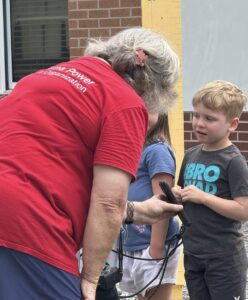Alabama Power helps garden grow at Lee Elementary School in Satsuma
When the “red shirts” are in sight, great things are in store. That’s Lee Elementary School teacher Samantha Tallent’s experience with members of the Plant Barry chapter of the Alabama Power Service Organization (APSO), who recently improved the school’s learning garden.

Lee Elementary School has one of Alabama’s six certified outdoor classrooms. (Sharon Meier / Alabama News Center)
Ten Barry APSO members recently helped Tallent and Lee Elementary replant the gardens in their outdoor classroom, which features raised wildflower and vegetable beds for grades K-6; a huge blueberry bush and a butterfly garden with a sundial; a koi pond with 10 fish; a 16-year-old turtle, Michelangelo, and its habitat; and a sensory path. The Satsuma school – which has one of the state’s six certified outdoor classrooms – has enjoyed Barry APSO’s assistance for six years.
The garden refresh not only enhances the natural environment and students’ educational experience – it also supports ecological sustainability while fostering a hands-on learning environment where students can engage with nature, understand the importance of environmental stewardship and cultivate a lifelong appreciation for the outdoors.
“Our garden is quite expansive,” Tallent said about the space, which was established seven years ago. “Maintaining it requires a significant amount of time. With so many children using the area, it’s become increasingly difficult to keep everything in good condition. We’ve definitely reached a point where additional support is needed, and certain elements require repair or replacement. APSO has been our saving grace, swooping in to help maintain this well-loved area year after year.”
That’s where Barry APSO members come in. Cherie Gatlin, Barry APSO treasurer, said the group’s work at Lee Elementary has run the gamut: Weeding, summertime painting of the campus and performing landscaping around the new track are just a few projects the Barry volunteers have tackled.
When Tallent said she needed help revamping the outdoor classroom, Barry APSO jumped to assist. Gatlin applied for a Good Roots Grant from the Alabama Power Foundation to buy 60 bags of topsoil, mulch, plants and several trees to replace ones that died during the February snowstorm in the Gulf. The new trees on the school grounds will provide shade, beauty and a habitat for wildlife. APSO also bought seeds for classes to plant during the next school year.
“We knew this Good Roots Grant would allow us to help with a lot of new things they needed for their garden,” said Gatlin, a Power Generation analyst at Barry. “We do a lot of physical labor in our volunteering. We planted lemon trees, a couple of shade trees and flowering trees. They have a turtle, which really likes to eat geraniums, so we planted those in the habitat. We added fresh soil in the raised garden beds because the classes plant different things through the year.”
“This is the first time we bought things to put in the garden,” noted Gatlin, who has worked at Alabama Power for 20 years. “When the children grow and produce what they’ve planted, they take them in the classroom, and they actually eat them.”
Barry APSO bought two new birdhouses to match the ones at the school, since one didn’t weather the storms. The feeders attract a wide variety of birds, allowing students to observe and learn about local species.
Most importantly, Barry APSO’s Zachary Holmes, Cindy Johnston, Amanda Lofton, Sharon Meier, Melanie Robins, Bill Ward, Tabitha Wright and Gatlin showed up to help with the labor. They started around 6:30 a.m. and worked until noon. They not only moved soil, added new plants and trees and cleaned the area; they also applied a fresh coat of colorful paint to students’ easel-type dry-erase boards in the garden.
All these efforts add beauty and make the garden more useful to Tallent’s classes.
“Barry APSO members believe in teaching kids to love and care for nature,” Gatlin said. “This project is a great way to make learning fun and hands-on while helping the environment. We’re excited to see how this will benefit the students and the community.”
Barry APSO’s work instills valuable life lessons
After teaching kindergarten for 10 years, Tallent is now the science lab facilitator for pre-K through sixth grade. She has a classroom in the science lab and the outdoor classroom, as well as helming the school science fair and an animal showcase project, in which students research and build an animal habitat and give presentations.
Barry APSO members have served as judges for Tallent’s two large projects and judged the spelling bee. Gatlin was thrilled when several students greeted Barry APSO members.

Barry’s Sharon Meier talks with students about the refurbished garden. (Amanda Lofton / Alabama News Center)
“It made me feel good, because the kids that were coming out to eat lunch out there recognized us, because we do go out there,” Gatlin said. “One little girl asked us, ‘Hey, did you like my science project that I won the other day?’ They know that’s Alabama Power when they see us.”
Tallent is “over the moon” with Barry APSO’s work. She pointed out the garden is sustainable, allowing children to watch plants grow and reseed. For children whose parents don’t have gardens at home, Tallent said the project is helping provide integral life lessons about how to care for the natural environment, while also nurturing a source of food.
She pointed out that, 15 to 20 years ago, most people had gardens. Now, Tallent most often hears children comment that gardening is something they do with their grandparents – not mom and dad.
“Gardening is really an exciting skill, and the children love it. Their favorite is root vegetables – carrots, potatoes. They don’t see anything, then they start digging and pull it out of the ground. They think they’ve found gold,” Tallent added, with a chuckle.
Appreciation of Barry APSO team runs deep
Tallent said, “I just can’t say enough good things about our Barry APSO volunteers and Alabama Power.
“The kids love them. … I’ve probably met 15 to 20 volunteers at this point,” she said. “They’ve been great – real hands-on, eager to help. It’s just nice. And once I say, ‘Hey, could you fill this bed with soil,’ they’re on it. You don’t have to oversee as much.
“Not everybody wants to volunteer their time outside – it’s hot,” Tallent said. “They’re very eager to help, and so nice. It doesn’t feel like a chore with them here helping us. I appreciate them so much.”








